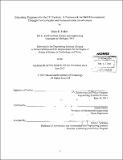Educating engineers for the 21st century : a framework for skill development through co-curricular and extracurricular involvement
Author(s)
Fisher, Dara R. (Dara Ruth)
DownloadFull printable version (8.811Mb)
Alternative title
Framework for skill development through co-curricular and extracurricular involvement
Other Contributors
Massachusetts Institute of Technology. Engineering Systems Division.
Advisor
Sanjay Sarma.
Terms of use
Metadata
Show full item recordAbstract
As the global marketplace becomes increasingly interconnected and multidisciplinary, graduates of undergraduate engineering programs face new challenges in communication, creative thinking, and teamwork as they enter the international workforce. To address this shift, over the last two decades American universities have adjusted educational objectives of undergraduate engineering programs to include new themes in international awareness, communication, teamwork, and other professional skills. Motivated by student leadership development programs at the new Singapore University of Technology and Design (SUTD), this thesis examines how student engagement in co-curricular and extracurricular activities promotes professional skill development in engineering education at the undergraduate level. Using a two-stage analysis of MIT student organizations and current literature in student involvement, this work presents a two-dimensional framework of the leadership and professional skills developed through participation in 22 categories of co-curricular and extracurricular involvement. The relevance of these skills to engineering education and practice is validated through interviews with managers and supervisors of entry-level engineers. In addition, these skills are compared with key educational outcomes specified by ABET, Inc. (previously known as the Accreditation Board for Engineering and Technology), further validating the relevance of the two-dimensional framework of skill development to engineering practice. Lastly, this thesis provides an analysis of strategies to promote student involvement and leadership development in engineering undergraduates.
Description
Thesis (S.M. in Technology and Policy)--Massachusetts Institute of Technology, Engineering Systems Division, 2013. Cataloged from PDF version of thesis. Includes bibliographical references (p. 103-113).
Date issued
2013Department
Massachusetts Institute of Technology. Engineering Systems DivisionPublisher
Massachusetts Institute of Technology
Keywords
Engineering Systems Division.